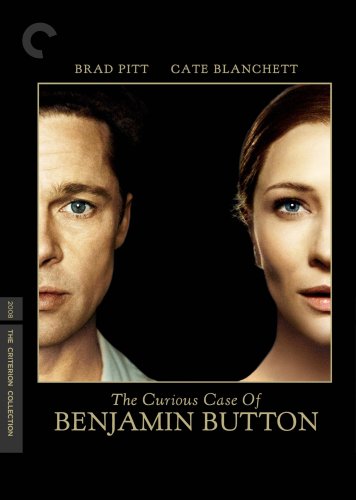 The Curious Case of Benjamin Button (2009, Criterion)
The Curious Case of Benjamin Button (2009, Criterion)
purchase from Amazon: DVD | Blu-ray
In a half-serious battle over whose giant robots rock harder, McG recently challenged Michael Bay to a genital-measuring contest, but having just finished all 165 goddamn minutes of The Curious Case of Benjamin Button, I’m willing to bet that David Fincher would beat them both. At the very least, he’s got to have the biggest balls in Hollywood.
Loosely based on a short story by F. Scott Fitzgerald (or, if you believe some people, a book of decidedly more recent vintage), Button tells the tale of a man who was born old and lived his life backwards, eventually dying in the arms of his one true love as an 85-year-old infant. As concepts go, it’s brilliant, and — as made plain by the voluminous bonus material included on the second disc of Criterion’s lovingly curated special edition — the kind of picture that would have been all but impossible to properly make more than 10 years ago. Of course, cutting-edge special effects and a $160 million budget don’t necessarily mean you’re going to wind up with a movie worth watching — even, as it turns out, if you have one of the best directors in the business at the helm.
Fincher has been doing solid work since his days as an ad man and music video director, and despite making his bones as a purveyor of darker (and sometimes sickly twisted) fare, he’s always made sure his movies have a heart. When you’re talking about stuff like Seven or Zodiac, that sentimental streak provides a useful counterbalance — but here, despite Fincher’s stated intentions, it overwhelms everything, hammering the viewer with a succession of shockingly ham-handed sequences that run the gamut from ominous (not five minutes in, screenwriter Eric Roth resorts to the dreaded phrase “some say he died of a broken heart”) to simply infuriating (without giving too much away, let me just tell you that the film’s final act resulted in me giving the finger to a hummingbird and stalking out of the room). It’s the kind of movie that lets you know right away that it intends to be BIG — the introduction wraps a framing device in a framing device — and spends nearly three hours doing everything it can to live up to that goal, with the notable exception of actually being a good film.
What Button is, in spades, is a feast for the eyes. Much as I hated the movie, I have to give major credit to Fincher, whose talent as a visual stylist remains undimmed, and cinematographer Claudio Miranda, who spends literally every moment making love to whatever the camera happens to be filming — whether it’s the sumptuous New Orleans scenery or a gorgeous cast that includes Brad Pitt and Cate Blanchett. Fincher and Roth give him plenty to work with, including a storyline that manages to incorporate Hurricane Katrina, the end of World War I, and plenty of shots of Pitt in all his sun-bleached glory; unfortunately, all that beauty is ultimately wasted on a film that would arguably be more compelling with the sound turned off. A little over 10 years ago, Pitt starred in another glowingly beautiful, overlong mess of a movie called Meet Joe Black; I guess he needs to get one of these out of his system every decade, but having now seen both Black and Button, I can only hope I’m smart enough to miss out on the next one. Button got plenty of good reviews during its theatrical run and received scads of awards nominations, so I don’t expect anyone to trust my cranky dissenting opinion, and I won’t give away anything here that’ll spoil your experience of the film. What I will tell you, however, is that our own Kelly Stitzel told me she was warned by a friend to skip Button and just watch Forrest Gump with a picture of Pitt taped to the screen. It was sage advice.
Normally, even the most interesting bonus materials pale in comparison to the actual film, but The Curious Case of Benjamin Button proves an exception to the rule — Criterion knows its extras, and there are hours upon hours of them here. Not all of them are worth accessing (Fincher’s commentary track adds nothing to the movie), but the centerpiece of the second disc is a three-hour making-of documentary that’s easily twice as interesting as the movie itself. Watching the long list of names that were attached to the project during its long development, you can’t help but feel your heart break a little for all the time and money that went into what should have been a wonderful film; similarly, Fincher and Pitt’s comments about the darkness they perceived at the heart of the movie offer cruel hints of Button‘s many missed opportunities.

![Reblog this post [with Zemanta]](http://img.zemanta.com/reblog_e.png?x-id=6072bc41-adac-4229-ba02-1b7332bb3ed2)



Comments